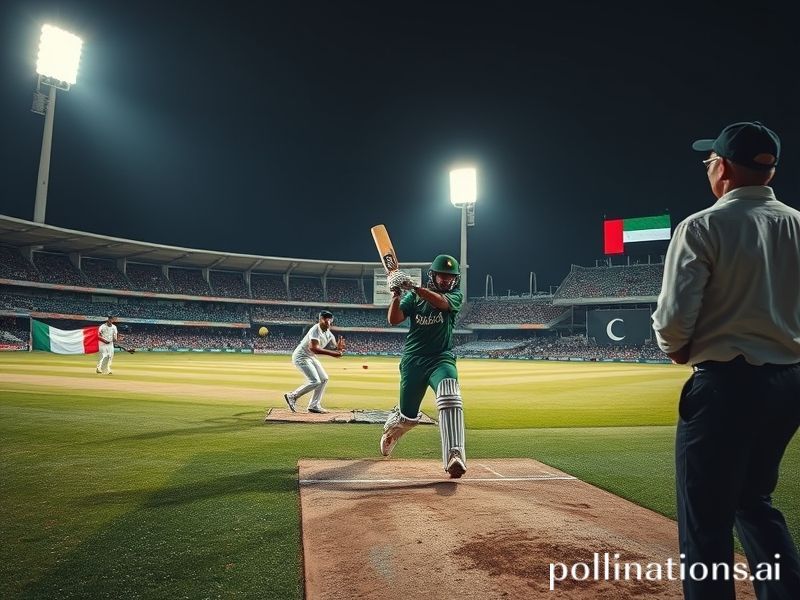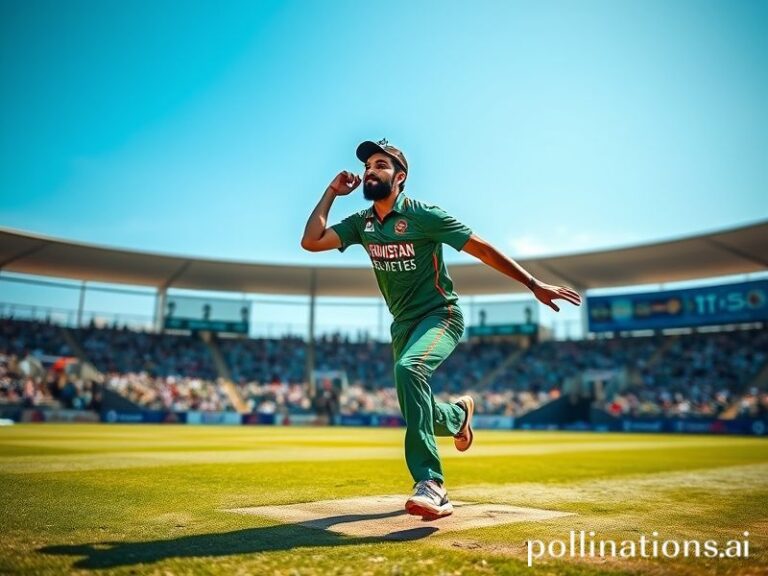pak vs uae
T20 World Cup Dispatch: When Pakistan Meets UAE, and the World Pretends It’s Just Cricket
By Dave’s Locker International Correspondent
Somewhere between the endless Dubai construction cranes and a Karachi heatwave that could melt ball bearings, Pakistan and the UAE are scheduled to face off in a T20 match that the International Cricket Council insists on calling a “neutral-venue clash.” Neutral, of course, in the same way an arms fair is a “trade show.” The stadium is in New York, the players are from Lahore and Sharjah, the broadcast rights are owned by a Cayman Islands shell company, and the only thing truly neutral is the Swiss bank account that will ultimately collect the receipts.
Global spectators tuning in at 3 a.m. in Sydney or 10 p.m. in São Paulo will be sold the usual fairy tale: bat versus ball, nation versus nation, pure sporting theater. In reality, it’s geopolitics in whites—an accidental referendum on South Asian soft power, Gulf-state flexing, and the curious modern habit of outsourcing everything, including national pride. Pakistan has been playing “home” games in the UAE since 2009, when visiting teams decided that being shot at was not a standard post-match press conference. The UAE, ever obliging, offered its desert fortresses in exchange for a cut of the television pie and the chance to remind investors it’s open for business—even if that business is vicarious nationalism.
For the wider world, the fixture is a handy Rorschach test. Washington will watch to see if the Pakistani diaspora in Long Island cheers louder for green shirts or UAE “home” jerseys, hoping to calibrate future campaign stops. Beijing’s delegates, killing time before another Belt-and-Road handshake, will tally crowd shots for facial-recognition training data. Meanwhile, London’s betting markets—regulated by the same people who brought you the 2008 financial crash—will offer odds on everything from the number of wides to how many seconds the camera lingers on whichever Sheikha just bought another Premier League club.
The players, naturally, are the last to be consulted. Most Pakistani squad members learned their craft on concrete wickets where the bounce is as reliable as the electricity supply; their Emirati counterparts grew up in academies where the grass is imported weekly from Georgia (the country, not the state) and the analytics team has more laptops than MI6. One side will worry about spin-friendly pitches; the other about whether the post-game buffet meets five-star hotel standards. Both sides know that failure means trending on Twitter next to a hashtag sponsored by a crypto exchange no one has heard of.
And yet, there is something almost touching about the whole charade—like watching two distant cousins argue over the family inheritance while the house burns down. Pakistan needs the win to reassure itself that 230 million people still constitute a cricketing superpower, even if half of them can’t find a passport that lets them leave. The UAE needs the win to remind everyone it’s more than just tax-free shopping and indoor ski slopes built by laborers who can’t afford a ticket to watch the match they built the stadium for. Everyone else just needs the broadcast revenue.
When the last six is struck and the obligatory fireworks fade into Long Island’s smoggy dusk, the scoreboard will reset to zero, but the ledgers won’t. Pakistan’s cricket board will still owe the UAE rent for “home” grounds. The UAE’s cricket board will still owe its success to South Asian talent pipelines it can’t quite acknowledge in polite company. And the rest of us will scroll on to the next outrage, having extracted 40 overs of distraction from a planet that’s beginning to feel like an overbooked connecting flight.
Conclusion: In the grand ledger of human folly, Pak vs UAE registers as a minor entry—an asterisk in the footnotes of late capitalism. Still, for three hours, millions will forget their energy bills, their visa rejections, and the creeping suspicion that history is just a highlight reel with better graphics. And when the final wicket falls, the world will return to its regularly scheduled chaos, slightly poorer, mildly entertained, and none the wiser. Just another day at the office for everyone except the players, who will wake up tomorrow to discover that yesterday’s heroics were already monetized, meme-ified, and ultimately meaningless—until the next neutral venue calls.







